Skate and re-generate: skateboarders making a difference to the environment
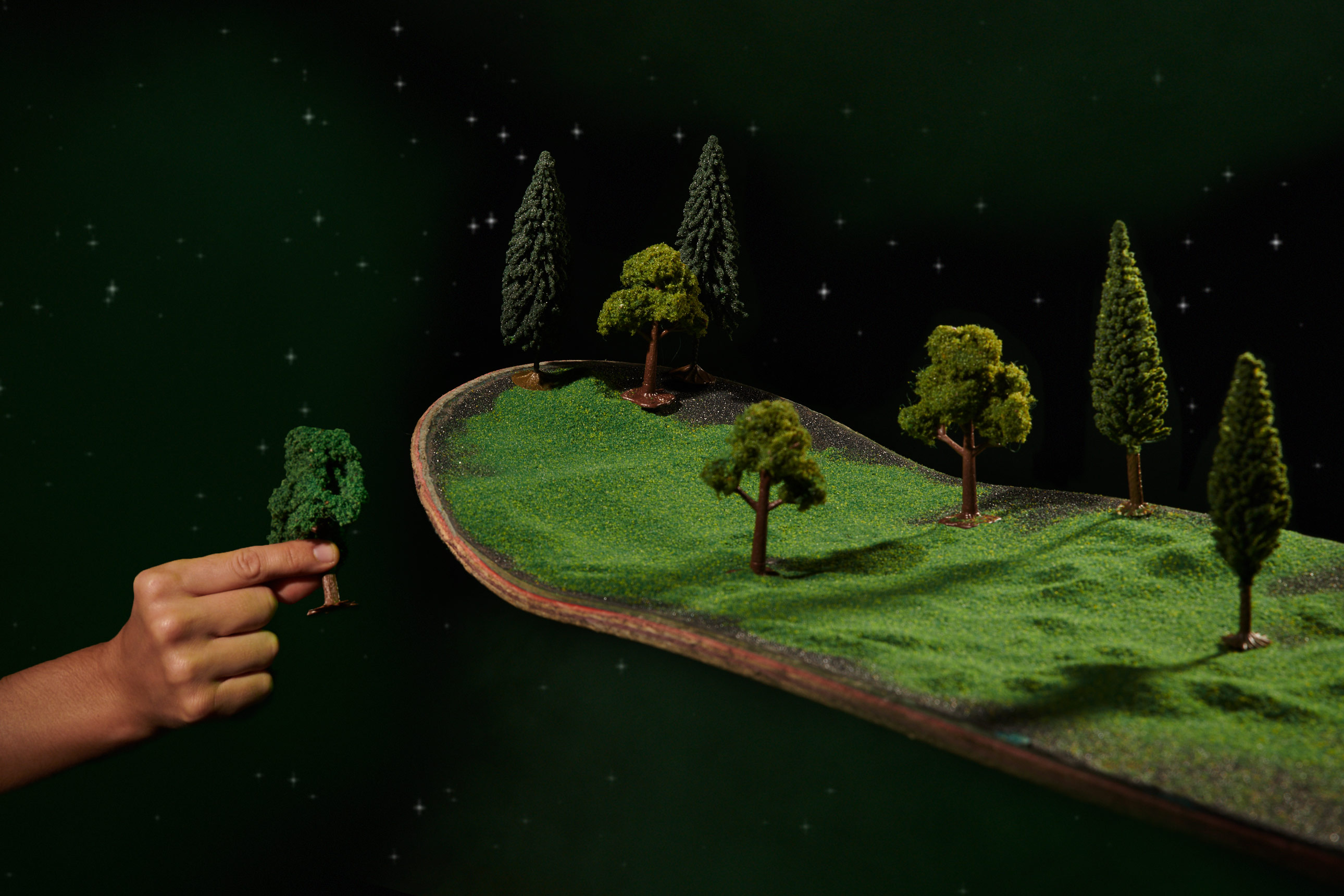

As skateboarders, we have embraced the idea of ‘skating and destroying’ and ‘skating and creating’. But increasingly, we also need to think about ‘skating and re-generating’ in terms of the environment and issues of sustainability.
By its nature, skateboarding requires a unique and sensitive way of relating to land. We scan every inch of a street spot or skatepark with laser precision, and get to know every bump and crack under our feet in micro detail, as if our lives depend on it. Because they do. But how are we, as skateboarders, also directing that level of energy and attention to the larger environment?
The inspiration for this article is a young school-aged girl, Ariel Ehlers, who is an environmentalist. She’s not a big name like Greta Thunberg; however, like Thunberg and other remarkable youth activists from First Nations and other populations, she is part of a global movement of young girls demanding adults in power take responsibility. Ariel is 12-years old, lives in the tiny rural town of Chinchilla in Australia, five hours drive from the closest city. It is a classic farming town, famous for its watermelons, and with just one skatepark, where she is one of the only girls who skates. She is also known for being caring, strong and independent. In September 2019 while thousands of other young people around the world left school yards to march together in the Extinction Rebellion movement, Ariel was the only kid to go out and protest in her town.
Images of this brave young school girl sitting defiantly and magnificently alone, with a modest hand-written sign on crumpled cardboard in front of the town’s council headquarters, captured the attention of media around the world, from the USA to Canada. In doing so, the spotlight was also shone on how gas mining in the Chinchilla area risks causing a contamination threat to local waterways and farmers. Ariel is symbolic of how even one person taking small steps in any part of the world can make a significant difference.
The state of the environment, of course, is a concern to many skaters of all ages, backgrounds and geographies. I reached out to five skaters who are doing their part to care for the earth, oceans and air around us: Cecely Todacheenie from the Diné Navajo Nation; Kirby Clark in Victoria, Australia who is based on the land of the Kulin Nation; Tora Cordelia Waldren from the Gold Coast, Australia, based on the land of the Yugambeh and Kombumerri Peoples; Atita Verghese from India; and Peggy Oki, the legendary OG Californian skateboarder and long-standing activist from the USA. I asked about how they care for the environment, what inspires them, and which 3 steps we can all take action on.
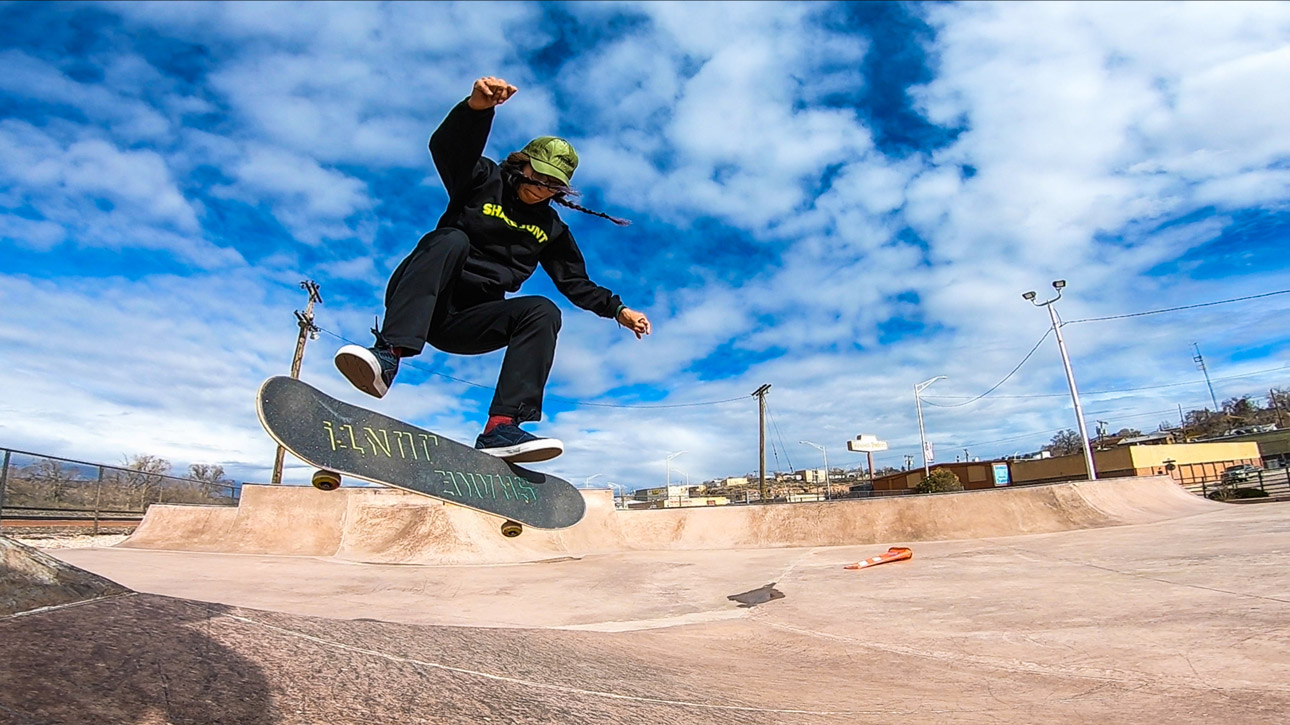
Cecely is a skateboarder in her 30s from the Diné Navajo Nation who is well-known globally for her fast and stylish technical street skating and as an inspiring figure to both Native and non-Native skaters. She is on flow and sponsored by various local and international brands including F.S.C, Enchantment Skate Shop, Spitfire Wheels, Thunder Trucks, Huh Bearings, Seefenìx and Rastaclat.
Some of the more sustainable ways we can act in skateboarding can be seen in even small steps. Cecely states, “One of the ways I advocate and care for the environment through skateboarding is by collecting used skate goods to redistribute to nearby skate communities. This allows skate goods to not end up in landfills and we do our best to recycle.” Such concerns are also reflected by F.S.C., one of her sponsors. In the past they would use plastic-wrap for every single board, but now have them delivered in eco-friendly packaging and hope to incorporate more sustainable practices in their overall business. They also donate used boards to people in the community who will give them a second life or creatively repurpose them.
Cecely also promotes care for the environment in her local scene by showing how, as skateboarders, one of the places we can start is at skateparks. Cecely was a part of the development of the Gallup Skatepark on Highway 66 in New Mexico in 2018. “I’ve been cleaning up skate spots since day one. Living on the Reservation I had too.” Offering an important reminder of the broader environmental issues that Native people in particular face, she explains, “There are people that still live on the lands that were exposed to uranium…. I feel that the whole Navajo Nation is overlooked”. She advises that one way to assist is via the Navajo Sheep Project.
Cecely also reminds us that, “Even when you don’t know it, skateboarding brings out the best in you. Whether it’s fixing a skate spot or picking up trash. We all do our part in our own way.”
“Just like how we need to keep ourselves groomed, we need to keep our earth groomed as well. We are all in this together.”
Pick up trash. “Keep your surroundings and community beautiful by picking up trash and learning about your environment. When you are at the skatepark or a street spot look around and take in the energy. Pick up the lingering pieces of trash and clean it up. It takes your actions to help be the change and keep our planet going. Just like how we need to keep ourselves groomed, we need to keep our earth groomed as well. We are all in this together.”
Recycle skate goods. “Recycling skateboarding goods is also a great way to help. Don’t throw away your skate goods. Pass them on to someone in need so they can start or continue their journey. No matter what, we as skaters will take our brooms and clean up a spot. Seeing it before and after, we already have that feeling of accomplishment and excitement.”
Plant trees. “Plant trees and get involved with agriculture. Remember more trees, more oxygen! Grow some crops and learn about the land you skate on. Don’t forget to keep you and the planet healthy. Stay safe out there and keep shredding.”
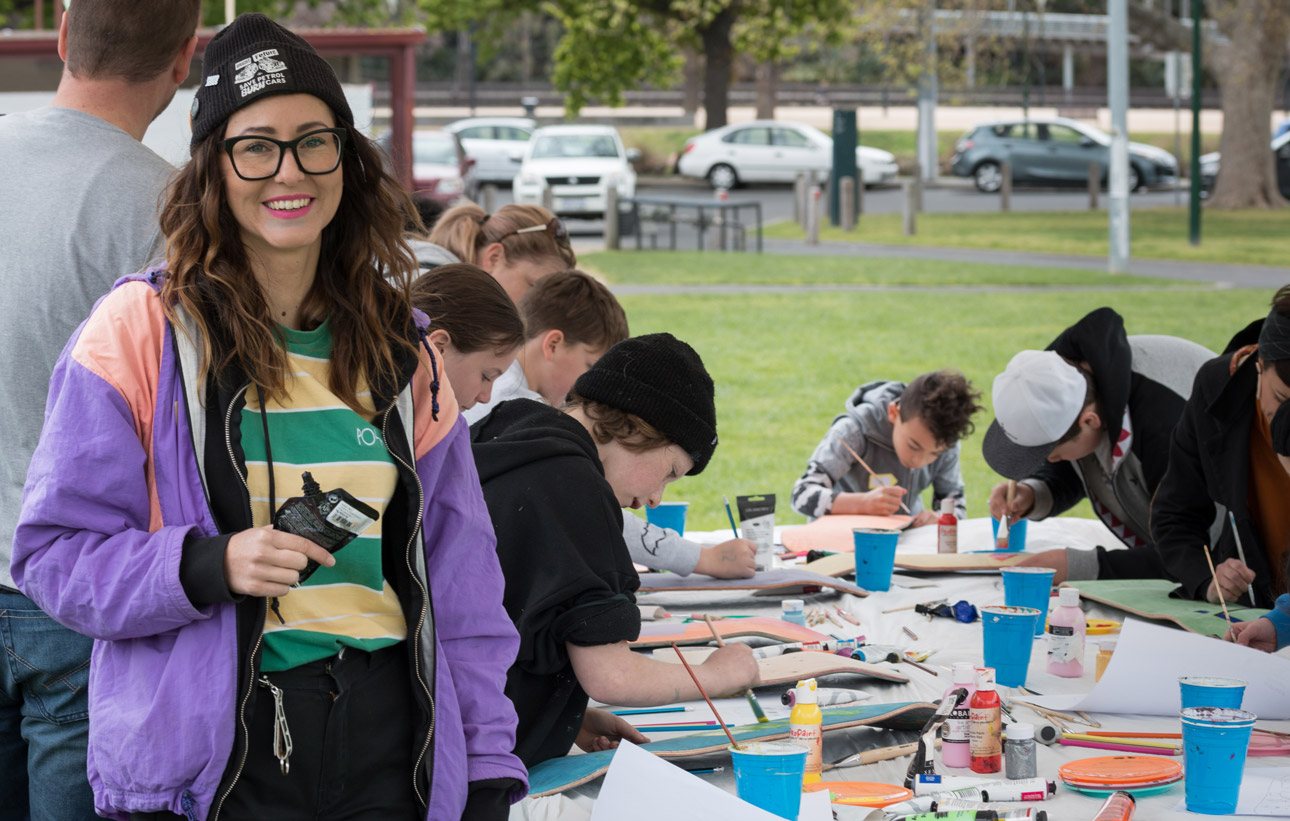
Kirby is a skateboarder in her 30s who is based in Naarm, Melbourne, in Australia. She was a skate rat in her teens before taking a break and joining the skate life again in her mid 20s. Since then she’s led the Decks for Change non-profit Decks For Change, which uses skateboard art to raise money for the building of skateparks in various countries around the world, including Iraqi Kurdistan and Nepal in recent years. As well as working on fundraising, Kirby has a background in design, systems thinking and sustainability. She is a Creative Theory Lecturer at Collarts and an educator-in-training at the UnSchool of Disruptive Design, which concentrates on social change and the environment.
For Kirby, one of the key barriers in turning things around for the environment has been people’s mindsets. “In my experience, skateboarding as a culture and community has liked to remain separate from environmental, social, and economic issues. The mantra ‘shut up and skate’ has blocked some potential positive change from skaters but thankfully that mantra is on the way out as we’re seeing a beautiful and ever-growing increase in the diversity of skaters bringing fresh perspectives and demands for a more equitable community.” Furthermore, she adds, “Everything is interconnected — the environmental issues that we’re seeing are directly connected to human rights issues as well as what drives our economy — so there’s a lot of opportunity for the skate industry and skateboarders as individuals to affect positive change.”
“The mantra ‘shut up and skate’ has blocked some potential positive change from skaters but thankfully that mantra is on the way out…”
Learn about the land you’re skating on. “If you are not Indigenous to the land you are skating on, make an effort to know who’s land it is. Naarm, also known as Melbourne, is home to some of the best skate spots in the world and the Traditional Custodians of the land I live and skate on are the Bunurong Boon Wurrung and Wurundjeri Woi Wurrung peoples of the Eastern Kulin Nation. When I first started learning about sustainability I learned it through the lens of systems thinking, that in nature’s brilliant interconnected complexity nothing is ever wasted, in fact, waste equals food and everything has a role. But this isn’t a new concept, Aboriginal and Torres Strait Islander peoples have cared for this land for at least 60,000 years and prior to invasion they had sophisticated agricultural practices that allowed plants, animals, and humans to thrive in harmony. We must pay homage to First Nations People when we’re talking about environmental sustainability and I’ll be the first to admit, I have been very ignorant of this in the past and I’m continuously working to decolonize the way I think and learn. As a descendent of colonisers, it’s uncomfortable at times but a very necessary step toward true sustainability. As skateboarders (specifically non-Indigenous skaters) we can all learn more about the land we’re skating on, and support and amplify the voices of First Nation folks.”
Hold brands accountable. “Hold brands accountable and know that as a consumer you hold power — your dollars are votes for the type of future you want to see. DM or email your favourite brands and ask what they are doing to reduce their environmental impact and move toward more sustainable products, systems, and services. If there’s something you think sucks (*cough* like how much plastic wrap PS Stix uses *cough*) tell them that as a consumer you’re not into it and demand better.”
Use your shoes and boards a little longer. “In terms of skating, even simple interventions, like skating your shoes and decks for as long as you can, have an impact. Everything comes from nature at some point, raw materials are extracted from earth’s finite resources to then travel around the world to factories turning them into usable products, which then travel around the world again to be purchased by us. By extending the life cycle of these products we’re reducing this carbon footprint. Recently I’ve been developing skate products for the circular economy, which unfortunately has been delayed due to COVID lockdowns but I’m really excited to start sharing more on that in 2021!”
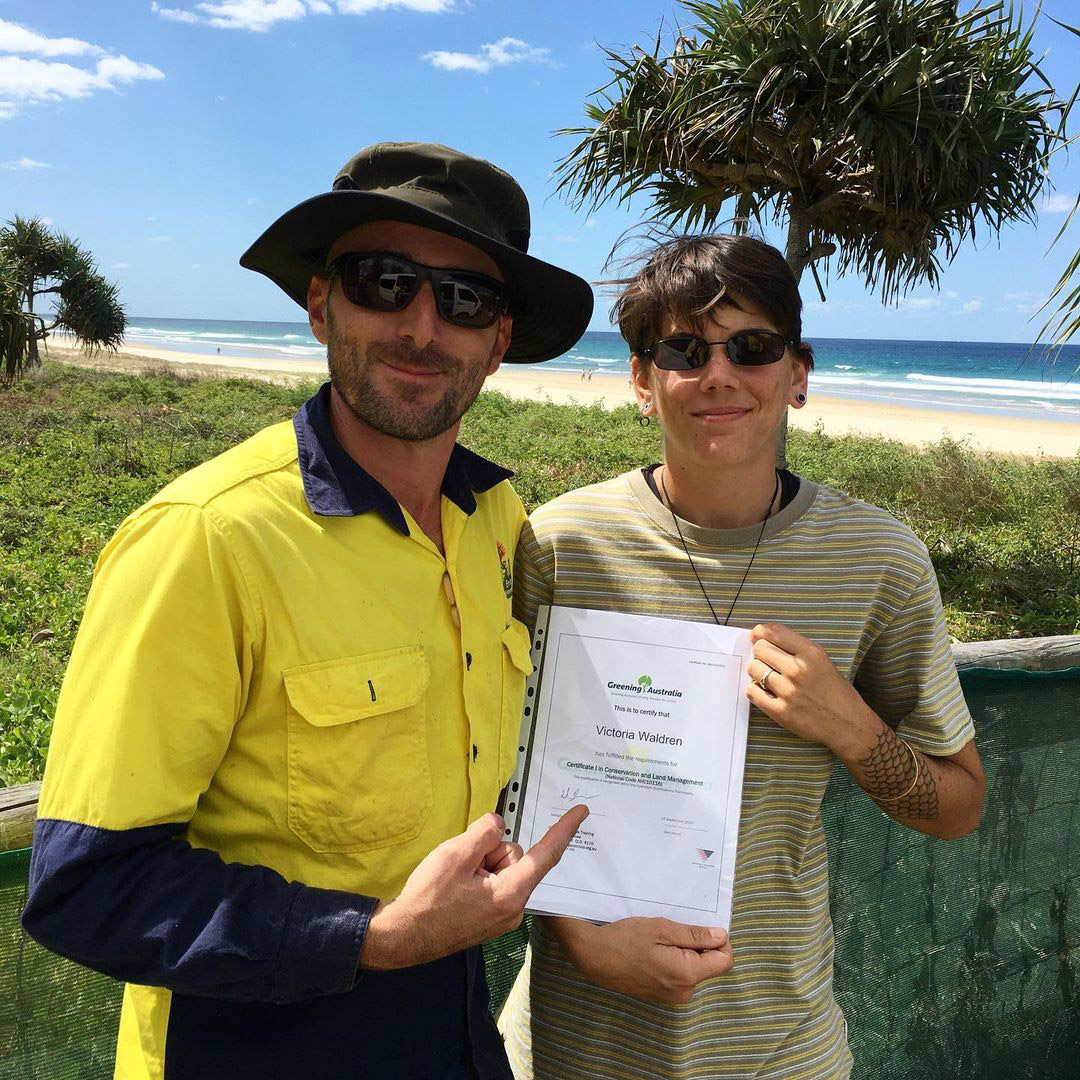
Tora is a skateboarder in her 20s from the Gold Coast in Queensland, Australia, who is well-recognised by locals for their laid back skating style, is a team member of 138 Skateboards, and runs a queer and gender inclusive skate coaching program at Wally’s Coaching. Passionate about the ocean and skating, Tora holds a BA in Marine Science, studied conservation land management and coastal restoration this year and is now adding carpentry skills to her repertoire. I first met Tora in my local skatepark in Meanjin, Brisbane around four years ago and was struck by how in touch she was with our natural world, both as a dedicated vegan and sustainability advocate. Soon after we met, Tora, Evie Ryder, Sophia Ross and I co-founded Girls Skate Brisbane (GSB, now We Skate QLD) to create safe spaces and good times in our skate scene. This includes encouraging skateboarders to care for the environments we skate in.
This year in Australia (and also in the USA), many of us have seen devastatingly powerful bushfires rip through the landscape, turning the skies a blood red colour, as if on Mars. Tragically, many lives have been lost, and thousands of homes, animals and landscapes were destroyed. Tora felt compelled to do something, as did many other skateboarders in our local community who were feeling “fear and sadness for the environment and wildlife. Everyone was looking for a way to contribute, so I used my time to find a way to help.” Tora came up with the idea of the Push For The Bush fundraiser. Over the space of a few weeks, more than 5 events were held in collaboration with Girls Skate Brisbane, Girls Skate Gold Coast, Truck Stop Skate Shop, the Australian Skateboarding Community Initiative, 138 Skateboards, Skate Connection, We Are Dropouts, Ol’ Man Skateboards Network and skate crews across two states.
The Push For The Bush campaign raised several thousand dollars in event donations while also channelling private and direct donations to multiple charities relieving the fires this year. In a quest to ensure more harmonious relations with nature and in their role as a skate ecologist, Tora also volunteers in many eco-projects and also creates art from recycled and refurbished goods. “It is one of my biggest passions. Recycling used skate decks and hardware into commissioned display pieces is now a shared hobby amongst my peers and community.”
Communicate and share. “Outside of larger and obvious sustainable support, being your best and healthy selves. Communication and sharing is key to supporting a better environment.”
Clean up your local skatepark. “Removing the litter and waste from the skateparks and other environments is important. Creating a clean space at the skatepark influences cleaner spaces elsewhere, at home or within other hobbies and sports.”
Shop sustainably. “Shop and buy sustainably, where possible, at second hand/thrift stores or online trading like Depop or Marketplace, to repurpose goods that would otherwise contribute to land waste and marine debris.”
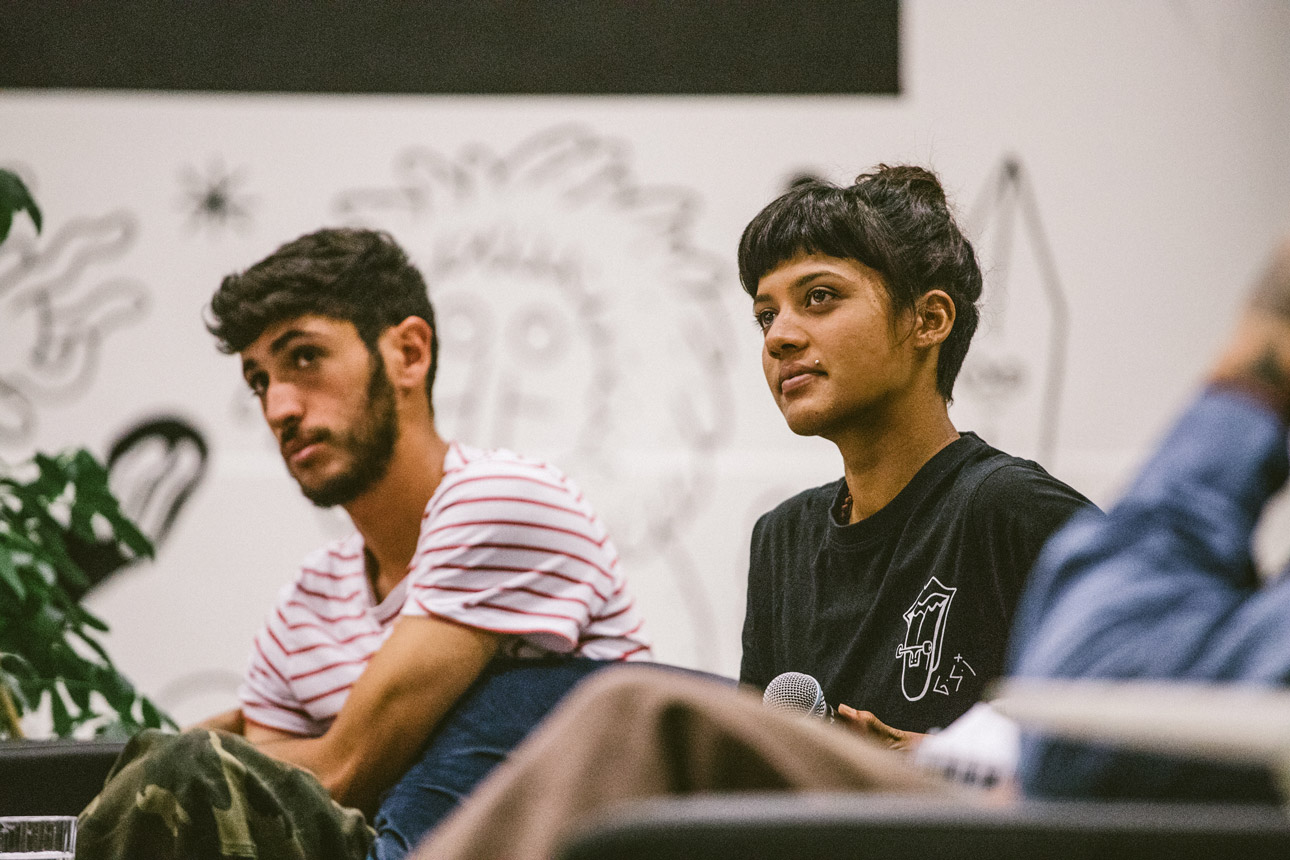
Atita is a skateboarder in her 20s who grew up in Bangalore and is the founder of Girl Skate India, which started in 2015, a couple of years after she picked up a board and fell in love with skateboarding. She is now sponsored by Vans and Stanley Tools, and has also worked for, and offered guidance to, various international non-profits, collectives, brands and skateboard projects with a focus on social change. When asked about her concerns around skateboarding’s impact on the environment she warns that at present, “nothing about skateboarding is really sustainable in terms of the health of our environment. Skateboarding was born out of the modern human condition of living in cities, and cities are prime centers of environmental degradation.” She adds, “Skateboarding connects us to the city’s infrastructure and its inhabitants. Skate culture revolves around grinding down man-made objects in search of a thrill. Skaters build more of these objects in skate parks or spots using concrete and wood which are highly toxic and unsustainable products. Skaters run through shoes and boards made out of fabric, rubber, metal and wood very often. The whole ethos of skate culture is to ‘skate and destroy’.”
Even when well-meaning, Atita also points out how skateboarding, at least as it has been done for a very long time, is at odds with nature. She explains, “Wildlife, be it plants or animals, do not thrive in environments covered with concrete/tarmac/loud sounds/wheels rolling around incessantly/grinds and slides… you get the rest.
With that being said, I want to make sure that I’m clear about something. My idea of nature and the environment comprises all existing natural elements and that includes humans as well.” Such conflicting relationships also extend to human labour. She states, “No society can claim to be healthy for the environment if there are still unfree beings in them. Be it humans, vegetation or animals.”
In terms of turning things around, we won’t, and don’t, need to have all the answers. Indeed, she states, “I have a hard time being a naturalist within the framework of skateboarding.” At the same time she believes taking steps matters.
“Skateboarding was born out of the modern human condition of living in cities, and cities are prime centers of environmental degradation.”
Make ethical and environmentally friendly products. “The industry can try harder to make products more ethically and environmentally friendly. From using friendly glues to press boards, to trying to use friendlier materials like hemp and khaki as shoe fabrics.”
Support your local skate brands. “The US has dominated skateboardings’ markets and the products they produce are being shipped all around the world. Not because other countries haven’t figured out how to do it equally well but because their marketing and reach has a much larger influence in the kind of products people buy.
Now, we all know how much the shipping industry is responsible for wide scale pollution, yet we continue to create a demand for American products. We as skateboarders need to understand that we must support skateboardings’ roots of shopping local. If these skateboard brands were making quality, eco friendly products within your geographical locations, and people were supporting them to grow in this way, it would prove healthier for the environment and also mean that you could eventually get a better product with the support they receive from you.”
Challenge the demolition of contest skateparks. “Challenge brands when they build new skateparks for big contests and then destroy the whole thing after the event has ended. This is not sustainable in any way.”
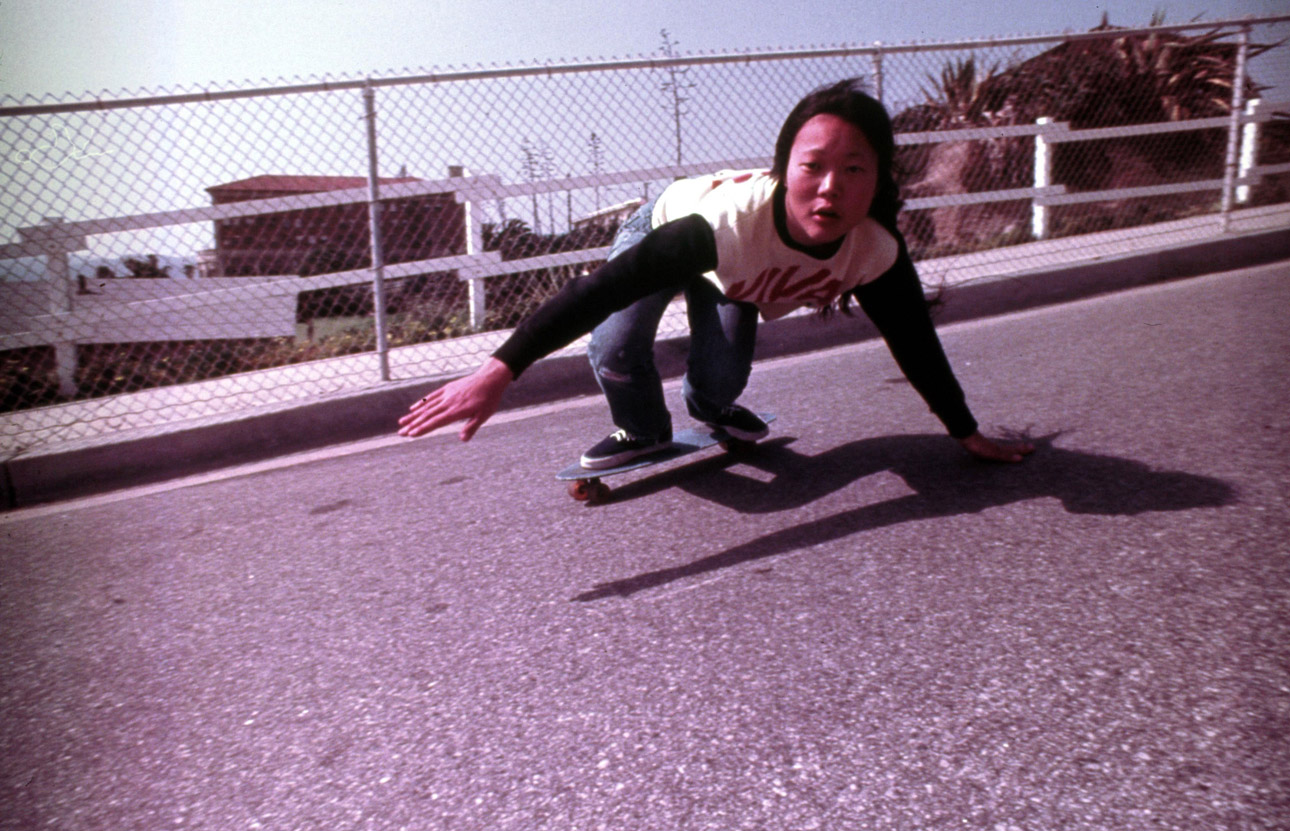
Legends need little introduction. Peggy Oki’s pivotal and long-standing presence in skateboarding and surfing is so multifaceted that it is not possible to even begin to do justice in capturing all her contributions to those scenes over the past 50 years. She is a Japanese-American who grew up in West Los Angeles. She was one of the original skaters in the 1970s with the Z-boys (invited by Jay Adams to join the Zephyr Competition Team) and features in Stacy Peralta’s 2001 award-winning documentary Dogtown and Z-Boys. Peggy is also an artist who specialises in illustrations and graphic design, and also teaches art to youth and communities through various social programs.
As a skate activist, her big projects have been centred on ocean and marine animal protection. She runs a Whales and Dolphins Ambassador program, the Let’s Face It visual petition campaign, and is also the founder and project coordinator of the Origami Whales Project, which began in 2004 as an art piece consisting of a curtain of 30,000 origami whales as a statement of protest. The curtain of origami whales was shown in Alaska in 2007 to coincide with the International Whaling Commission (IWC) meeting and has since traveled to many other locations as an artist statement that continues to draw attention to nations that still kill whales. Peggy also uses the Origami Whales Project to protest against orcas and dolphins in captivity.
When I asked her what kinds of things concern her about how skateboarding impacts the environment, she pointed to some macro systemic issues in society. “As with so many aspects of the consumer culture there is constant pressure for new product output. With most decks this calls for more timber and materials used. I would love to see more sustainable materials used in the skateboarding industry. It’s wonderful to see decks made from bamboo or recycled plastics, such as what Bureo has been doing as a solution to the problem of discarded fishing gear in the ocean. This matters a great deal to me because the fishing industry is one of the most destructive human activities on Earth.”
Providing a critical way to link what we do on the land to how that impacts our oceans, she explains, “much of the plastic waste in the world’s oceans, including 46 per cent of the plastic in the Great Pacific Garbage Patch, has the biggest impact on the health of our oceans, as does fishing“. For Peggy, fishing is still the biggest concern, “not even taking into consideration overfishing, nearly 308,000 dolphins and whales die annually from bycatch/entanglement“. While all species of sea turtles are endangered, “each year, more than 250,000 sea turtles are accidentally captured, injured or killed by U.S. fishermen…. All sea turtles are affected by commercial fisheries. Loggerheads and leatherbacks have the greatest risk because of their feeding habitats.” She adds, “In the 1990s, more than 12 million sharks and rays were caught annually as ‘bycatch’ or non targeted species, in international waters alone. That number has increased to an estimated 50 million sharks caught unintentionally each year, about half as many sharks as the estimated 100 million sharks killed by the commercial fishing industry per year for meat and fins.”
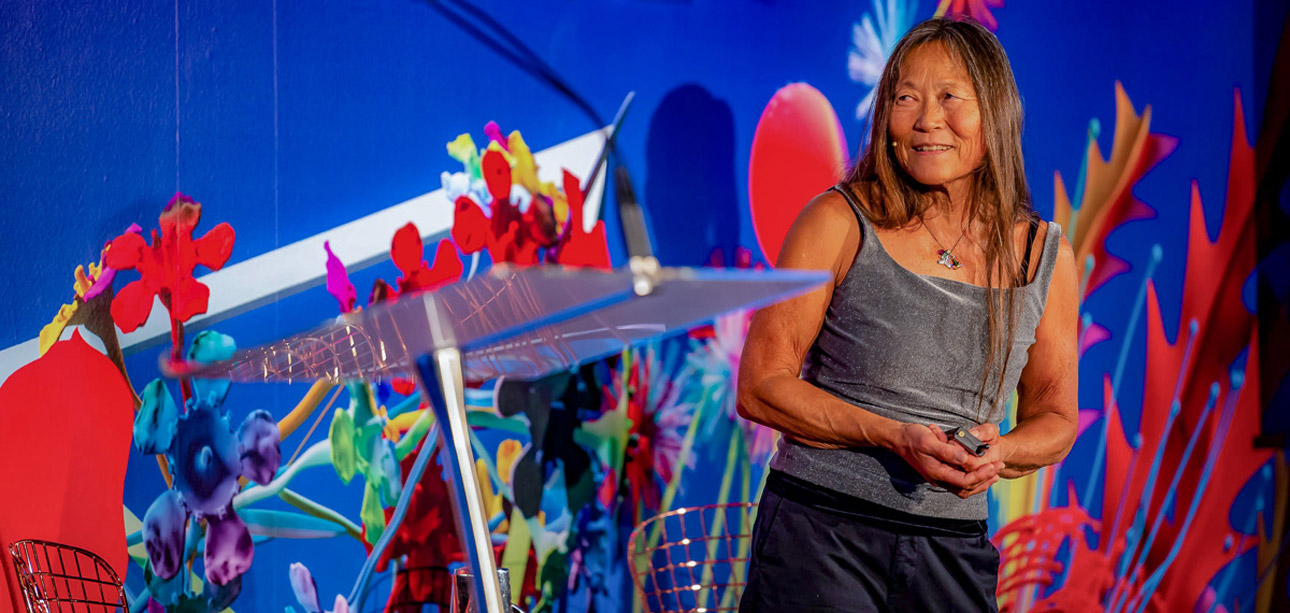
In the face of such huge issues, Peggy talks about how she keeps going, stating, “I am grateful for dolphins and whales, and so many life forms in the oceans and on Earth that inspire me. As the human race contributes to climate change and the sixth mass extinction, it is our responsibility to acknowledge the connection and address our impacts on this incredible planet.” Rather than accepting defeat due to being overwhelmed, Peggy also focuses on ways we can individually make an impact. “While citizens globally urge their governments to shift away from fossil fuel dependency, each and every one of us as individuals have the incredible power to cut our greenhouse gas emission impact in half by choosing a plant-based diet. Even the United Nations has acknowledged this.”
Referencing the Vegan Calculator, Peggy highlights how “by going vegan (plant-based) for one month an individual saves 620 pounds of CO2, 913 square feet of forest, 1,370 pounds of grain, and 33,481 gallons of water. Indeed, animal agriculture not only is responsible for massive greenhouse gas emissions, but also accounts for a shockingly excessive amount of water use and water pollution.”
Learning about the environment can also be done in a number of accessible ways. She encourages “anyone who cares about environmental concerns — including climate change, mass deforestation, ocean dead zones, excessive water use, overfishing, culling wildlife, mass extinction, and more — to watch Cowspiracy: The Sustainability Secret”.
Peggy emphasizes that people who have a public platform can also use that to share positive messages, stating, “As with some of my Zephyr skateboarding team mates, I never sought fame. But thanks to the documentary [Dogtown & Z-Boys] I have been utilizing my celebrity status as a voice for the things that matter to me. In this way the skateboarding community has an opportunity to become more aware.” She also adds that, “it’s been wonderful to share, through public speaking, about my journey from skateboarding with the Zephyr team to my activism for Cetaceans [dolphins and whales]. It’s fulfilling for me to inspire and empower people to follow their passion and to be of service for the things we care about.”
“It’s been wonderful to share, through public speaking, about my journey from skateboarding with the Zephyr team to my activism for Cetaceans.”
Shop sustainable. “Buy sustainably-produced skateboard products.”
Reduce, reuse and recycle. “Be mindful as consumers by being resource-conscious, including when out skateboarding or doing any activity. Use reusable water bottles.”
Consider a plant-based diet. “Everything is connected. I hope that everyone, including skaters of course, will consider the many reasons for trying a vegan diet, such as drastically reducing our impact on the planet. There are so many plant-based alternatives now readily available in most supermarkets. And there’s a great phone app called ‘Happy Cow’ that is helpful in finding restaurants with vegetarian/vegan options. Starting with one month works well for many people through programs such as Veganuary, Forks Over Knives, What the Health. The latter two are named after documentaries that have influenced many to go vegan. As I recommended watching Cowspiracy: The Sustainability Secret for environmental reasons, The Game Changers movie produced by James Cameron presents health reasons for going vegan. I’ve been vegan for over 20 years now and as an athlete appreciating the health benefits.”
Di’orr Greenwood’s skateboarding story is multifaceted and powerful, from rolling with a fun loving and hard-shredding all women’s crew, to…
Lisa Jacob has been building skateparks all over the globe, from Mozambique to Iraq, and just about every country in…
Pushing Boarders is the world’s only skateboarding conference, connecting a wide range of socially progressive groups and individuals, from emerging…